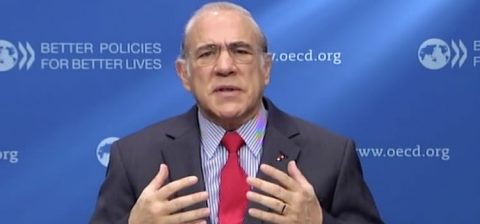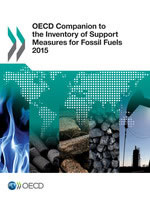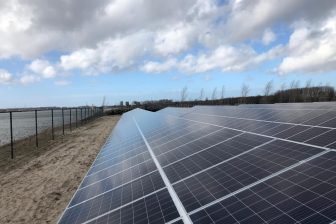
OESO: ‘Subsidies op fossiel sneller afbouwen’
22 september 2015 – De OESO vindt dat de grote landen sneller en meer moeten snijden in de subsidies voor fossiele brandstoffen. En volgens de OESO kan het ook makkelijk. ‘The time is ripe for change.’
‘(…) Landen zijn veel te traag met het verlagen van subsidies voor fossiele energie, zegt de OESO in een nieuw rapport. We hebben een ‘schizofreen’ energiebeleid, meent OESO Secretaris-Generaal Angel Gurria. “We proberen emissies te verkleinen en subsidiëren de consumptie van fossiele energie.”
‘Er gaat meer overheidsgeld naar fossiele randstoffen dan naar de strijd tegen klimaatverandering’
Uit een bericht van Het Laatste Nieuws
‘(…) Jaarlijks geven de overheden meer subsidies aan steenkool, olie en gas, dan aan de strijd tegen de opwarming van de Aarde. “Als we de subsidiëring stoppen, zullen we de middelen hebben die nodig zijn”, zo zei secretaris-generaal van de OESO Angel Gurrià vandaag bij de voorstelling van de studie in Parijs. “De internationale gemeenschap roept op tot 2020 jaarlijks 100 miljard dollar (89 mia euro) vrij te maken”, bracht de topman in herinnering. Met dat geld willen de geïndustrialiseerde landen vanaf 2020 de ontwikkelingslanden helpen met de klimaatstrijd.
Dat overheidssteun de productie en het verbruik van fossiele brandstoffen ten goede komt, is een “achterhaalde politiek”, aldus Gurrià. “We moeten van koers veranderen.” Hervormingen van de subsidiëring van die fossiele brandstoffen zijn daarbij een eerste stap. (…)’
 ‘The time is ripe for countries to demonstrate they are serious about combating climate change’
‘The time is ripe for countries to demonstrate they are serious about combating climate change’
Uit een persbericht van de OESO
‘(…) Government support to fossil fuel consumption and production in OECD countries and key emerging economies remains high, at USD 160-200 billion annually, according to a new OECD report. This support is hampering global efforts to curb emissions and combat climate change.
The OECD Inventory of Support Measures for Fossil Fuels 2015 takes stock of almost 800 spending programmes and tax breaks used by governments in the 34 OECD countries and 6 key emerging G20 economies (Brazil, China, India, Indonesia, Russia and South Africa) to encourage the consumption or production of fossil fuels. These include measures that reduce prices for consumers, as well as those that lower exploration and exploitation costs for oil and gas companies.
“The time is ripe for countries to demonstrate they are serious about combating climate change, and reforming harmful fossil fuel support is a good place to start,” said OECD Secretary-General Angel Gurría.
“Governments are spending almost twice as much money supporting fossil fuels as is needed to meet the climate-finance objectives set by the international community, which call for mobilising 100 billion US dollars a year by 2020. We must change the course. This new OECD Inventory offers a roadmap to turn around harmful policies that are a relic of the past, when pollution was still seen as a tolerable side effect of economic growth.”
Around two-thirds of the measures identified in the OECD Inventory were introduced before the year 2000, and in a very different economic and environmental context. Changing policy priorities make it necessary for governments to rethink the relevance and effectiveness of policies that use taxpayers’ money to sustain our reliance on fossil fuels.
The OECD Inventory shows that while slight progress has been made over the past three years, total support to fossil fuels remains high, reinforcing the need for sustained reform efforts. Lower oil prices present a unique opportunity for governments to phase out support for the consumption and production of fossil fuels.
In countries that have seized this opportunity, policymakers must consolidate the gains from reform and resist pressure to reintroduce support should fossil fuels become more expensive in the future. (…)’
Bronnen
OESO, 21 september 2015: Support to fossil fuels remains high and the time is ripe for change
Rapport, 21 september 2015: OECD Companion to the Inventory of Support Measures for Fossil Fuels 2015 (bestellen, lezen voor abonnees, geen publiek toegankelijke versie, downloaden alleen met het betaalde Franse programma Keepeek, afgeschermd voor particulieren) (62 pag, prijs e-book pdf € 16)
RTL Z, 21 september 2015: ‘Verlagen subsidies voor fossiele energie gaat te langzaam’
Het Laatste Nieuws, 21 september 2015: “Meer overheidsgeld voor fossiele brandstoffen dan voor strijd tegen opwarming”
Foto: OECD



